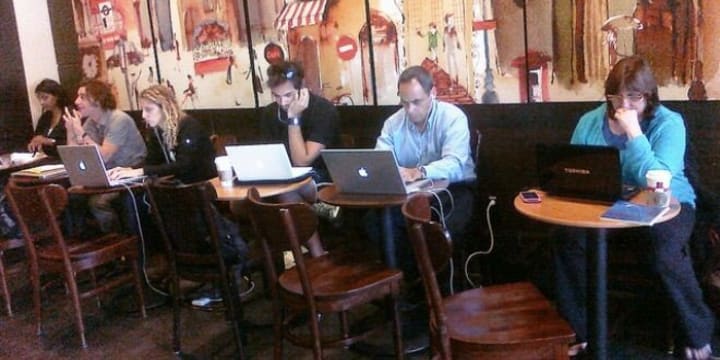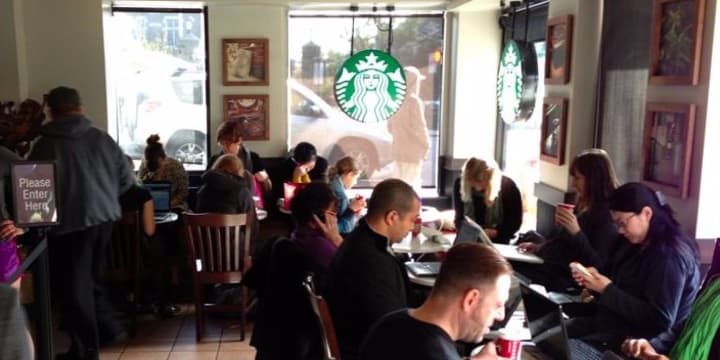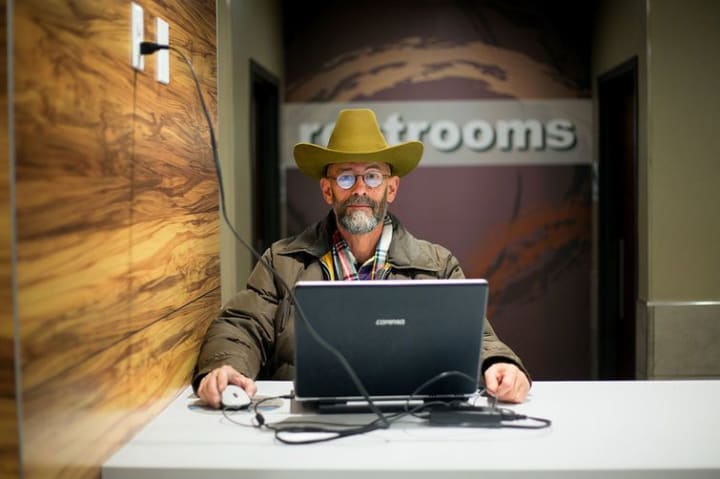Part 1: Today, the Equation Is Simple - Faster Internet Access Equals Greater Economic Opportunity!
All around us, we see how our work and our lives have changed, thanks simply to Internet access. Now, having fast, reliable access to the Web has become essential to our economic well-being today—both individually and collectively, making improving our digital infrastructure a top priority.

Sometimes, big megatrends are sitting right there in front of you, or maybe at the table next to you! And yes, sometimes, those trends can even be spotted on a routine morning "research trip"/caffeine stop at your local Starbucks, McDonald's, or local coffee house.

The new face—and place—of the American workforce
Look around, and whether it is morning, noon, or night, you will see many folks huddled with a cup of coffee—or of course, in the America of 2019, a giant, whipped-cream filled extravaganza of calories and caffeine! And in front of them will be their laptop and/or their tablet and/or their smartphone—and quite often, all three at the same time.

Customers are sipping and working at any Starbucks in America right now...
As our technology has continued to become "faster, better, and cheaper" and as our economy—and the way we work—have both undergone radical, transformative change over the past few decades, one undeniable image comes to my mind that symbolizes this transformation. It is an image that I can guarantee that you can find by walking into any Starbucks location right now—or most any other public gathering spot with free and fast wifi. That is the Starbucks patron, sitting alone at a table or a long bar table, nursing a Frappuccino or a latte for hours on end. He or she is there not so much for the coffee, but to work.

"Prime Time" for work at the local Starbucks...
Right now, there are likely hundreds of thousands of our fellow Americans somewhere, sitting in the fairly quiet coffee house, or alternatively, seeking out the quiet corner of a fast food restaurant. They are there simply to do what they consider as their "work."

Photographer Nolan Conway chose this as the cover image for his collection of photos of McDonald's customer from across the country that he fittingly titled, "Behold The Face Of America." (See: Pinterest)
How these individuals choose to work in these venues is as varied as are the possible ordering choices one might hear uttered in line by the more "sophisticated" Starbucks customers. They may be working their alone, or they may be gathered with several of their colleagues. They may have nothing but their device or devices in front of them, or they may have a pile of papers, binders, and receipts, scattered over a few square feet of table space. They may be working for one employer, or working for several. They may be part of the "freelance economy," working independently on their next gig. They may be updating their website or their blog, or simply trying to catch-up on their email. They may be monitoring their eBay sales of what some consider "collectibles" for $10 or so dollars, or they may be trying to close their latest big, big real estate deal worth hundreds of thousands of dollars.

The modern student doesn't study at the library, that is, unless the library is a coffee house!
And yes, they may not "technically" be employed at the moment—by anyone. They may be a student, or a group of students, working on a project or studying for a test. They may be seeking a job, "working" to submit their resumes and follow-up on leads as they look for "work" in the modern way online. They may simply be there to try and read even a "real" paper book, while, of course, multitasking with their mobile electronics, as is the modern way with all of our wifi necessary and power needing devices.

Reading is free, but lattes do make it better!
And so what you see happening each and every day at your favorite local coffee stop is "Exhibit A" of a reality in American life today. This is just how so very important—how absolutely critical—having access to fast and reliable Internet connectivity is in our lives today. While we want to download our games, view our cat videos, argue our politics on Facebook, and watch our movies and TV shows with smooth, crisp connections, those are just the luxuries of fast connectivity. The real crux of the matter is that having fast, reliable access to the Web is essential to our economic well-being today—both as individuals and collectively as a country.
And so when we talk about our nation's infrastructure, most times the politicians and the economic development types are thinking in terms of physical infrastructure. In a gridlocked Washington, DC, one of the few things that politicians both left and right, both blue and red, both urban and rural and on and on and on... can agree upon today is that America really, really needs to focus on its infrastructure. From roads to bridges to to rail to airports to ports, much of what we have built in the past is getting old and outdated (not to mention unsafe). And today, there is even more need for new infrastructure to follow, let alone get ahead, of shifts in where people live and work today, as in many parts of the country, the highways and byways and mass transit does not nearly adequately "fit" the real - and constantly evolving—patterns of people's lives—and commutes.
So yes, we do have a physical infrastructure crisis, but we also have a silent crisis that most politicians—and really most of us—simply ignore, or find our own ways to cope with. That crisis is as plain as the line at Starbucks and exemplified by that guy or gal trying to work on a laptop at McDonald's while kids hopped up on Happy Meals and Coke run back and forth to the playland! So, as both technology has evolved and "work" has changed to enable many of us to be able to work anywhere that there is good, reliable and preferably fast wifi, our digital infrastructure has not kept up with the megatrend in the changes in society.
What we see in terms of people working at locales from coffee shops to fast food restaurants to hotel lobbies to emerging coworking spaces and now, increasingly at public libraries, is not the megatrend itself, but a major symptom of the silent crisis of our lagging digital infrastructure in the United States. Rather, what we see are people coping with the reality that our digital infrastructure is not nearly where it needs to be. In ways mirroring classic consumer behavior and economic principles, people are innovatively finding ways to do the things that they need—and want—to do on the Internet, even if the Internet they have—or don't have—is not nearly what they need for today's work from anywhere, communicate from anywhere, and yes, watch and play from anywhere world.
So, in the second part of this article series, we will look the public policy challenges for all levels of government—and really for us all as Americans—as we look at the crisis of our lagging digital infrastructure. And in 2019, more and more Americans are realizing that the equation for economic advancement—for themselves and for those all around them is indeed quite simple: Faster Internet access equals greater economic opportunity!
How we can go about making that possible will be the focus of the next article. And as we will see, with great disparities to be found between cities in terms of their citizen's ability to access the digital world effectively, digital infrastructure is an issue that will be especially crucial for state and local leaders to tackle effectively in order to improve the economic prospects—and the lives—of their constituents.
Connect with the author.
Want to learn more about the work of Professor David C. Wyld? Want to work with him for your company’s benefit? Connect with him here.
About the Creator
David Wyld
Professor, Consultant, Doer. Founder/Publisher of The IDEA Publishing (http://www.theideapublishing.com/) & Modern Business Press (http://www.modernbusinesspress.com)






Comments
There are no comments for this story
Be the first to respond and start the conversation.